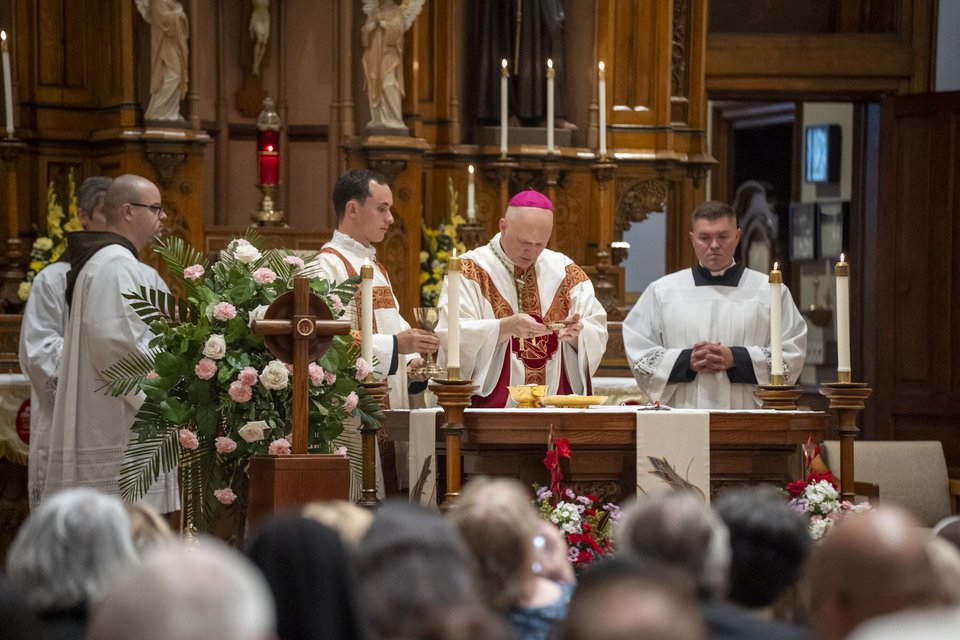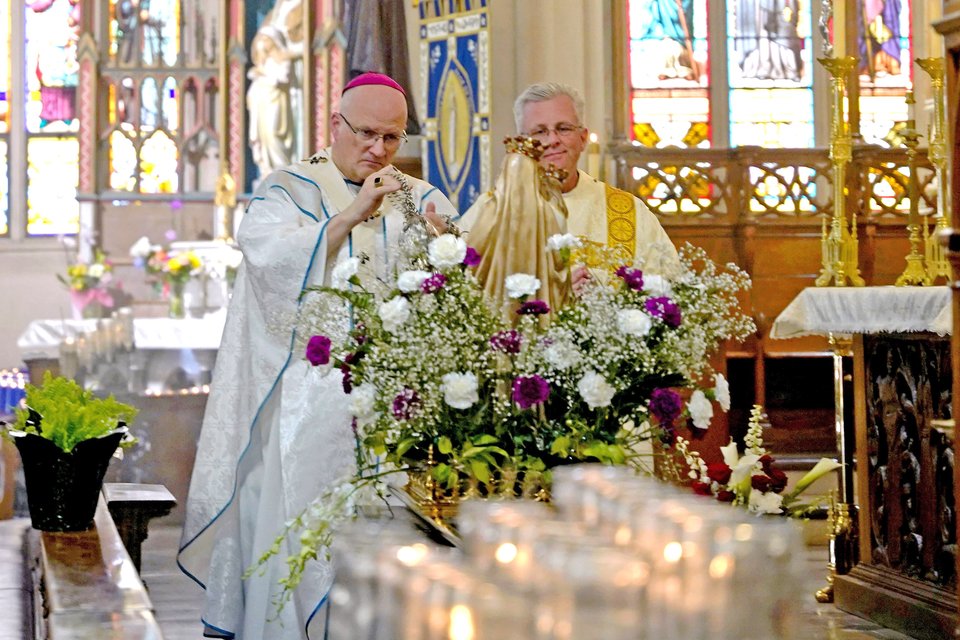Patroness of the Americas sends all of us on mission, Bishop Cepeda tells congregation during Mass following skits, music, dancing
DETROIT — When the feast of Our Lady of Guadalupe, traditionally celebrated Dec. 12, falls on a Sunday, the Church's liturgical guidelines allow for bishops to make alternative provisions to honor the patroness of the Americas on another suitable date.
Because feast days don't supersede the Church's feast day par excellence — Sunday, the Lord's Day — other arrangements can be made.
In the Archdiocese of Detroit, Archbishop Allen H. Vigneron and other members of the episcopate, clergy and parishes did just that Dec. 10, honoring Our Lady during a special celebration at the Cathedral of the Most Blessed Sacrament.
The regal Mass included a procession of banners, dancers in traditional Aztec attire, drums and guitar music — all traditional elements of Las Mañanitas, a typically pre-dawn celebration of Mary that features the Bienvenida, a welcoming song with an image of Our Lady of Guadalupe, honoring her 1531 appearance in Mexico to St. Juan Diego, which led to the conversion of the country.
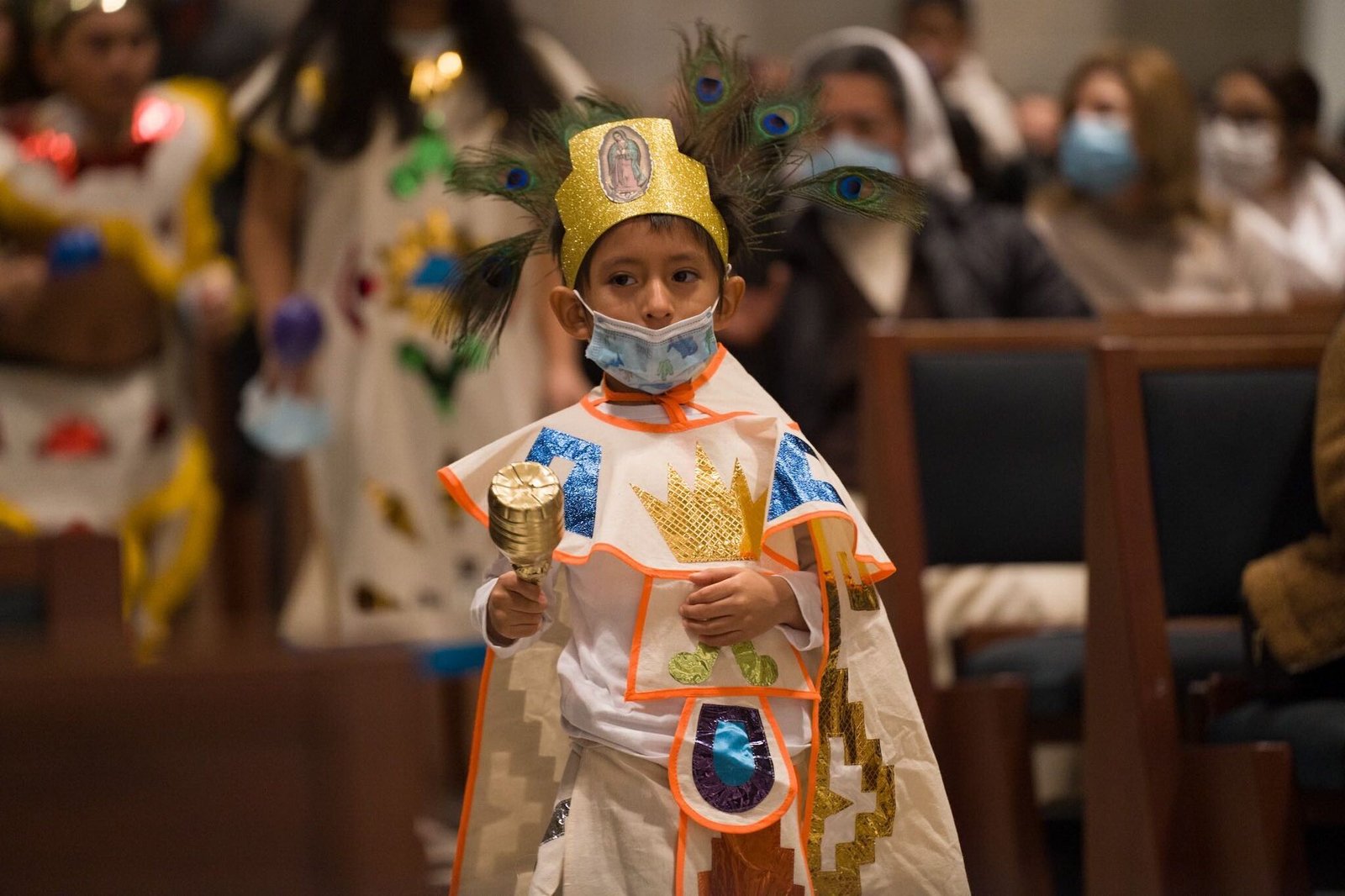
“The apparition of our Blessed Mother Mary to St. Juan Diego as Our Lady of Guadalupe, speaking in his native language, affirmed the respect and inherent dignity of all of God’s children,” said Marlon De La Torre, Ph.D., director of evangelization and missionary discipleship for the Archdiocese of Detroit. “Through her message to Juan Diego, she brought triumphant focus to Jesus Christ for the whole world and eventually became known as patroness of the Americas.
“Hispanics throughout the world, especially in our Mexican communities, have a sincere and loving devotion to Our Lady of Guadalupe because she identified and embraced the people of God in Mexico and brought them closer to Christ,” De La Torre added.
With the feast day falling on a Sunday this year, the cathedral hosted parishes with prominent Hispanic populations for a Mass celebrating the Virgin’s appearance in Mexico, where she claimed the title Reina de Mexico, “Queen of Mexico,” seen at the catalyst for the faith’s flourishing in Mexico and Central America.
“I want to take the moment to thank Archbishop Vigneron, my brother bishop, for allowing me to celebrate this Mass, along with my brother bishop, brother priests, for being here and celebrating this Mass in a community of faith, hope and love,” said Auxiliary Bishop Arturo Cepeda, who celebrated the Mass with Archbishop Vigneron and Auxiliary Bishop Donald Hanchon concelebrating.
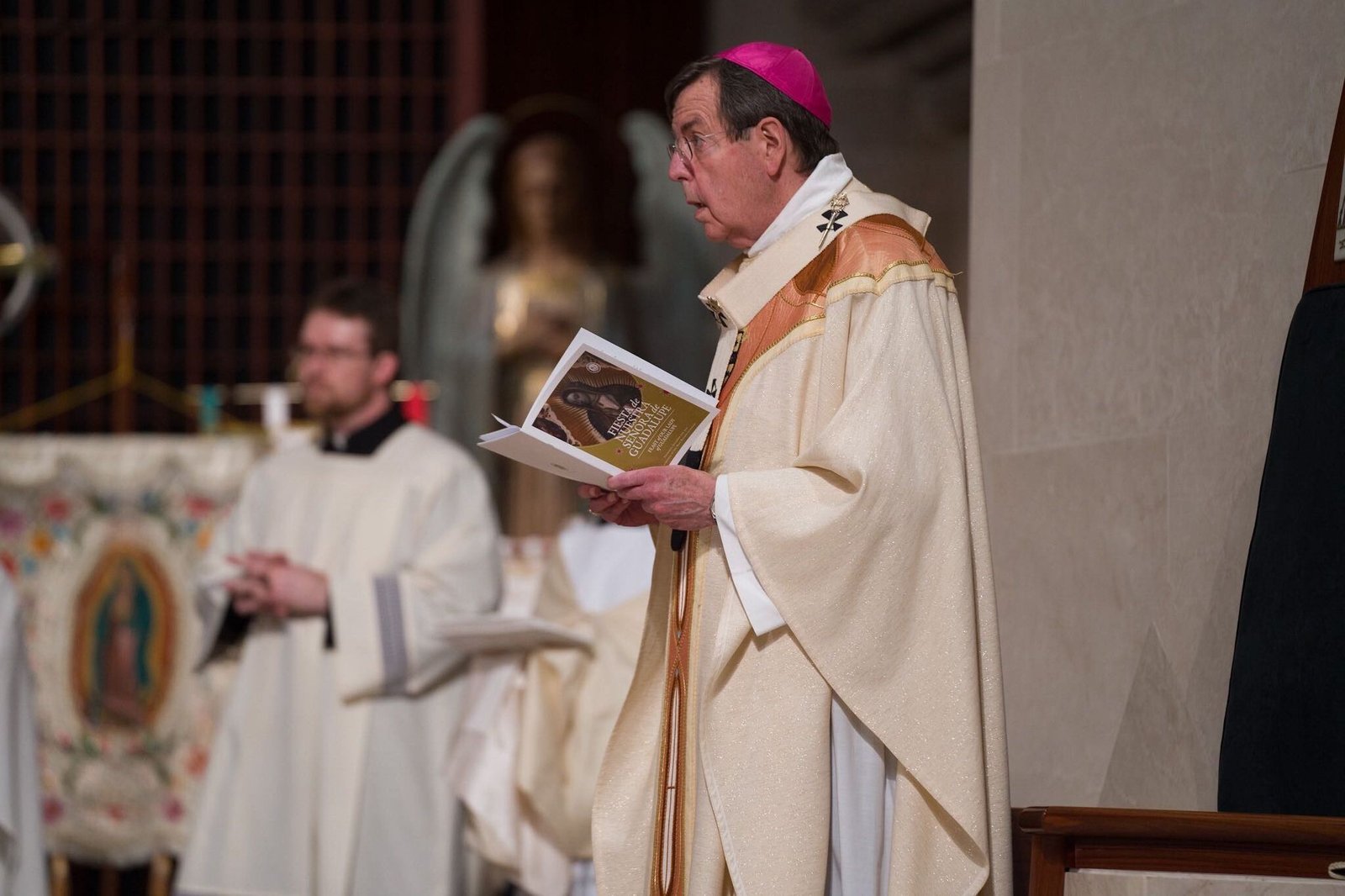
The story of Our Lady of Guadalupe revolves around the Virgin Mary appearing four times to Juan Diego, a Chichimec peasant in what is modern-day Mexico.
The first appearance took place on Dec. 9, 1531, when Mary instructed Juan Diego to tell the bishop of Mexico, Juan Zumarraga, to build a chapel in her honor.
After an initial rebuttal, the Virgin appeared to Juan Diego three more times. With the third time, the Virgin Mother instructed Juan Diego to go to the top of a hill and gather flowers in his tilma, a garment worn by Meso-American people.
Juan Diego took the flowers to the bishop, but when he tried to dump the flowers on the floor, the tilma instead revealed the image of Our Lady of Guadalupe, which Bishop Zumarraga immediately venerated.
Bishop Cepeda noted St. Juan Diego was sent by Mary to announce the Gospel to the bishop, just as Catholics today are sent on mission to announce the Gospel.
“We gather as a people of faith, a community of love, a community on mission, and in this case, it’s the same mission St. Juan Diego was given by Our Lady,” Bishop Cepeda said in a homily that was in both Spanish and English. “This mission has been the mission of the Church since it began: to announce Christ."
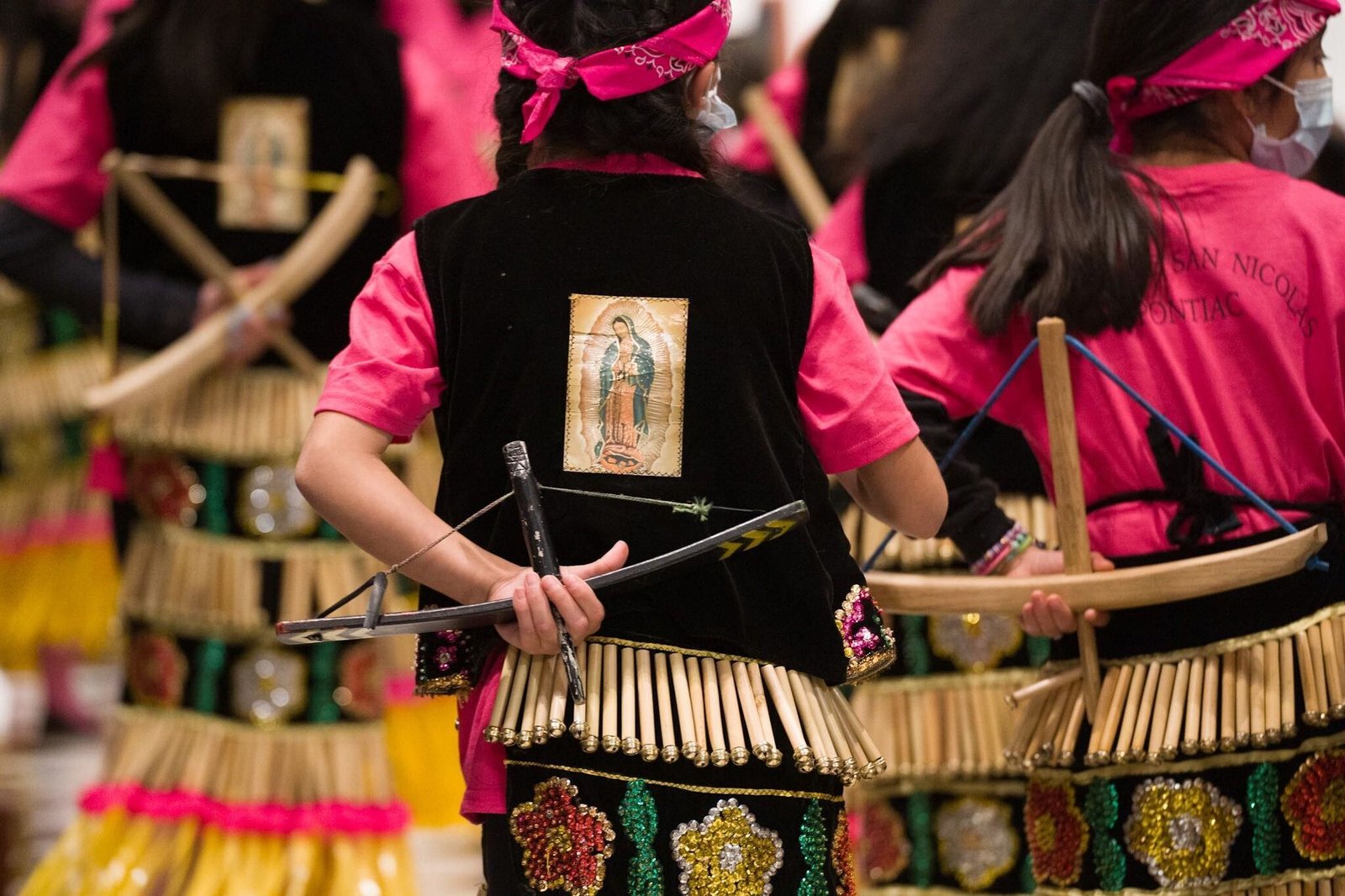
The Mass featured a reading from the Gospel of St. Luke, in which Mary goes to visit her cousin Elizabeth, who greets Mary with, “Most blessed are you among women, and blessed is the fruit of your womb” (Luke 1:42).
Mary’s traveling to bring Jesus — in the womb — to others is an example of evangelization, Bishop Cepeda said.
“We give thanks to God for the mission in Detroit we have to ‘unleash the Gospel,’” Bishop Cepeda said. “That is our hope, as a people of faith. Mary is an example of being on mission. In today’s Gospel, she goes and she serves as a witness to the Gospel as soon as Our Lord is in her womb. She goes and serves, announcing Christ.”
Following the homily, 69 parishioners were consecrated to Our Lady of Guadalupe. Parishes and churches in the Archdiocese of Detroit that have groups dedicated to those consecrated to Our Lady of Guadalupe include Most Holy Trinity, Detroit; Our Lady of Guadalupe, Detroit; the Basilica of Ste. Anne de Detroit; St. Juan Diego, Detroit; St. Damien of Molokai, Pontiac; Most Holy Redeemer, Detroit; St. Francis of Assisi-St. Maximilian Kolbe, Ray Township; St. Gabriel, Detroit; St. Hedwig, Detroit; St. Matthew, Detroit; St. Joseph, Lake Orion; St. Mary, Wayne; and St. Anastasia, Troy.
Before Mass at the cathedral, parishioners prayed the rosary and enjoyed performances from dancers and musical groups giving honor to Mary, including a traditional Aztec dance from St. Juan Diego Parish’s La Tilma group.
Our Lady of Guadalupe celebrations to take place this weekend
Saturday, Dec. 11
- Church of the Divine Child, Dearborn: 8:30 a.m. Bilingual Mass followed by a small reception
- St. Alfred, Taylor: 10 a.m. to 1:30 p.m. Music, 1:45 p.m. Apparitions of Our Lady of Guadalupe, 2:30 p.m., Dancers, 3 p.m., Mass, 4 p.m. Gathering
Sunday, Dec. 12
- St. Mary, Wayne: 5-7 a.m. Las Mañanitas, 1 p.m. Rosary, 2 p.m. Mass, 4 p.m. Reception and Dance
- Guardian Angels, Clawson: 11 a.m. Mass followed by food, games, crafts and a short play about St. Juan Diego and Our Lady of Guadalupe
- St. Damien of Molokai, Pontiac: 7:30 a.m. Las Mañanitas at St. Vincent de Paul Church; 8:30 a.m., Mass at St. Michael Church, 10:30 a.m. Mass at St. Vincent de Paul Church, 12 noon Mass at St. Michael Church, 3 p.m. Crowning of Mary at St. Michael Church, 4 p.m. Rosary at St. Michael Church, 5 p.m. Mass at St. Michael Church, 7 p.m. Mass at St. Vincent de Paul Church.
- Basilica of Ste. Anne de Detroit: 9 a.m. Las Mañanitas, 10 a.m. Mass with traditional Mexican dance, music and worship. Breakfast following Mass in Ste. Anne Hall.
- Most Holy Redeemer Church, Detroit: 5 a.m. Las Mañanitas, 8 a.m. Mass, 10 a.m. Mass, 12 noon Mass, 4:30 p.m. Outdoor procession, 5:15 p.m. play about the Vision of Our Lady of Guadalupe, 6 p.m. Mass.
Copy Permalink
Feast days



